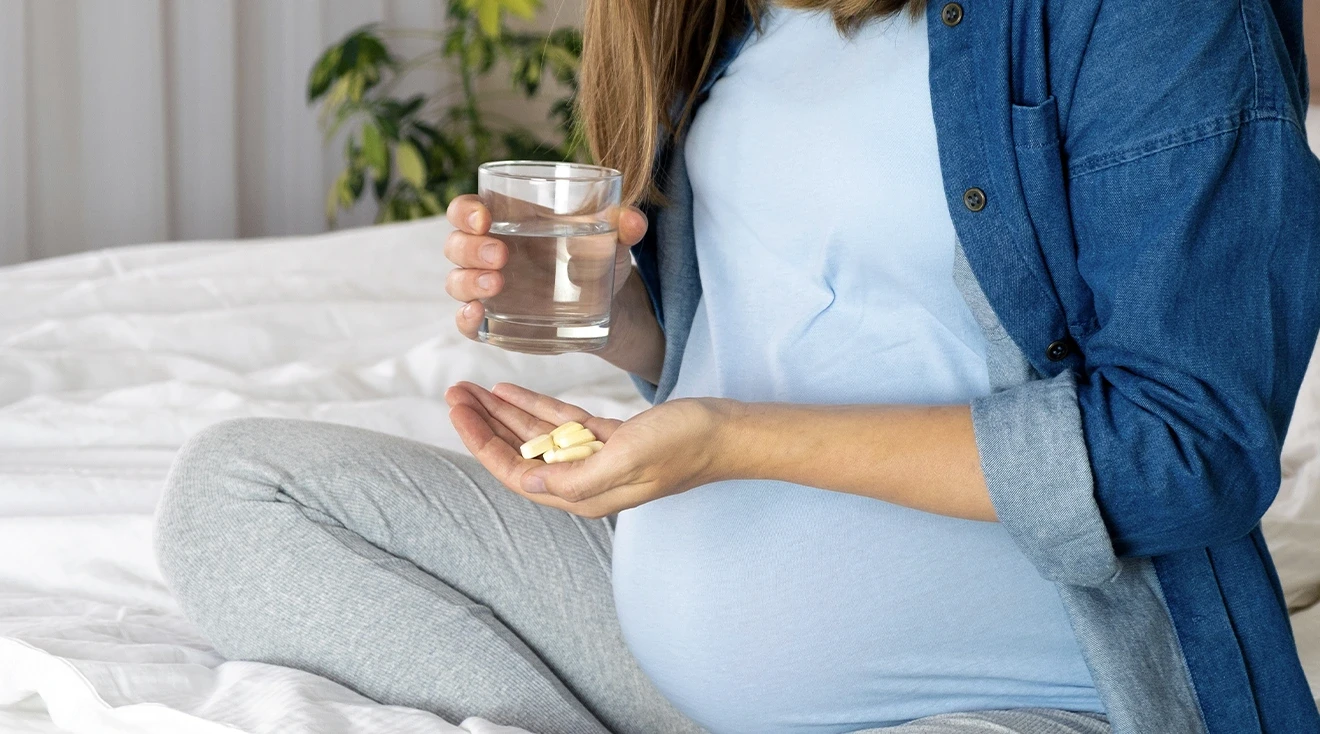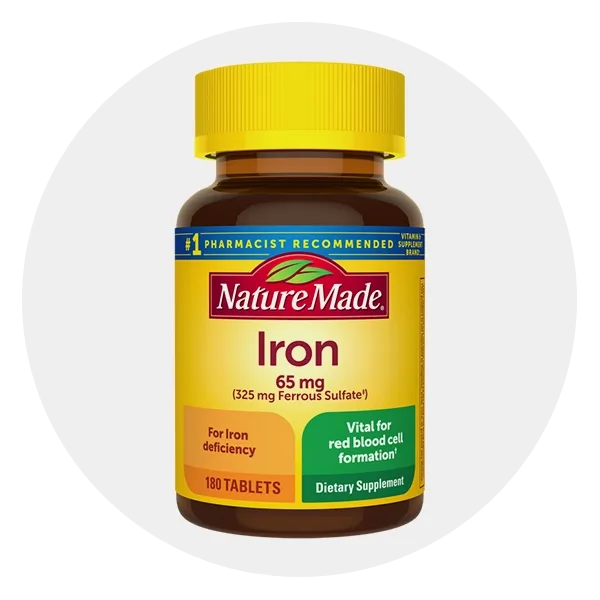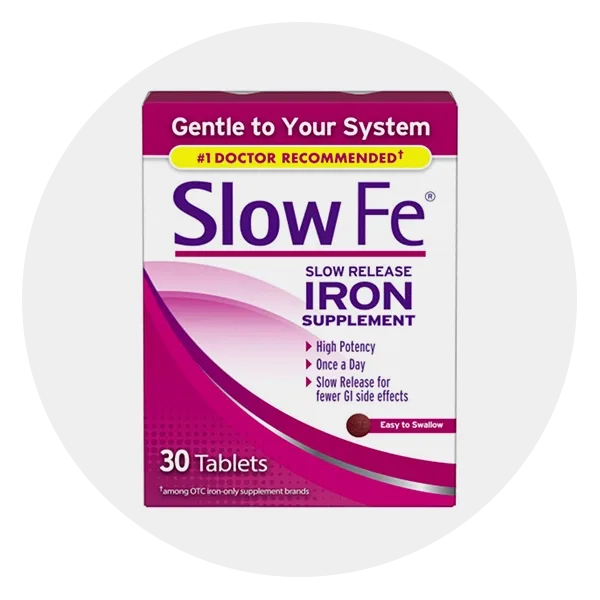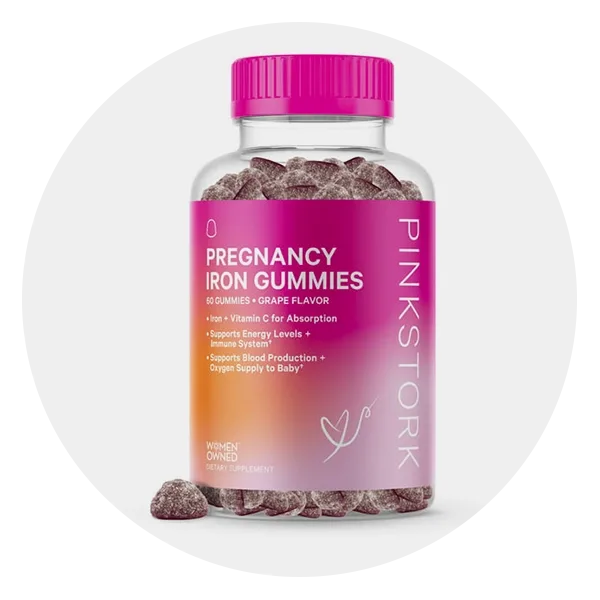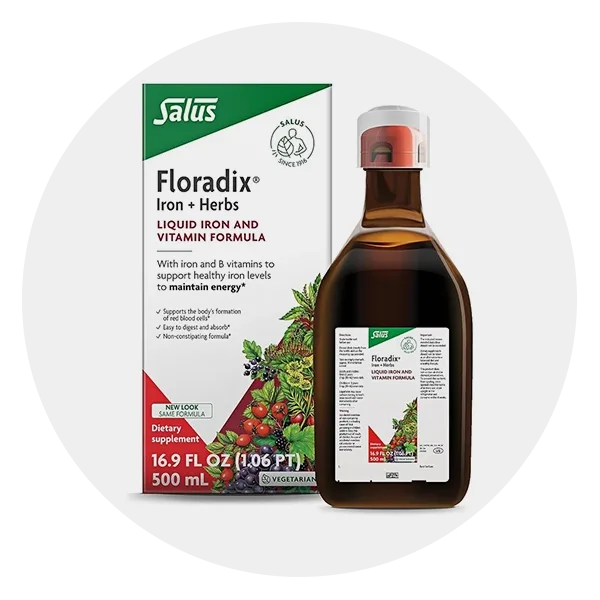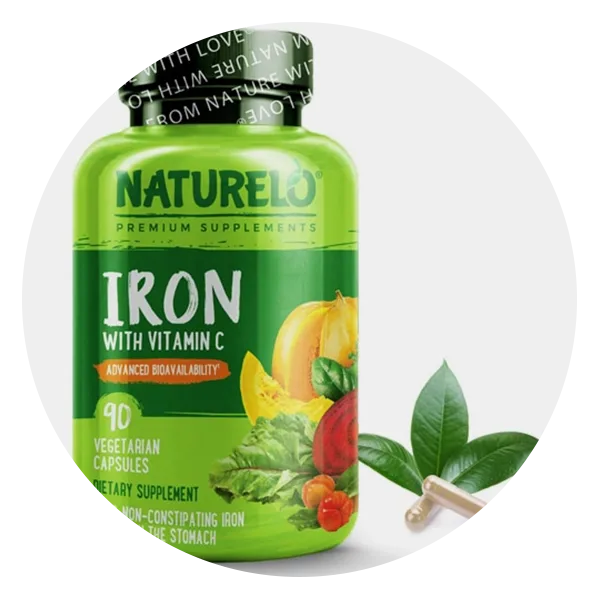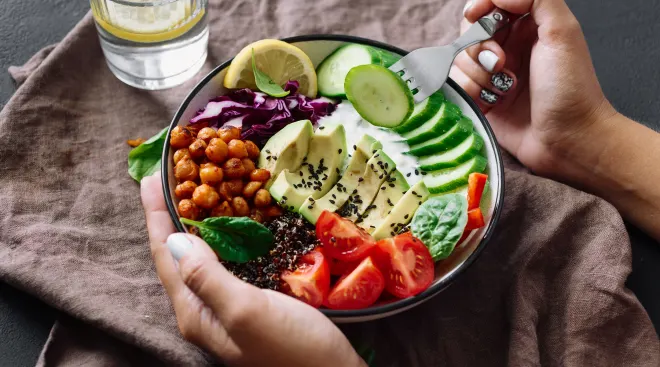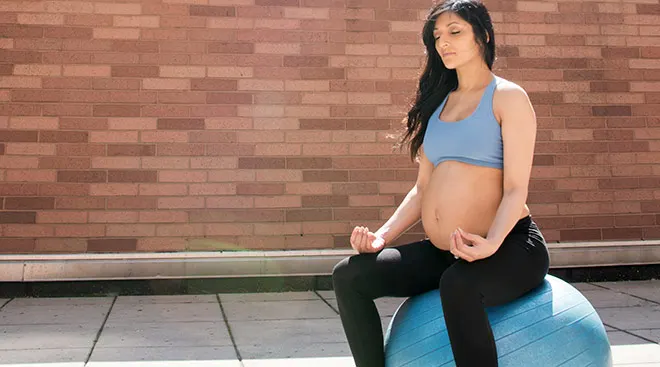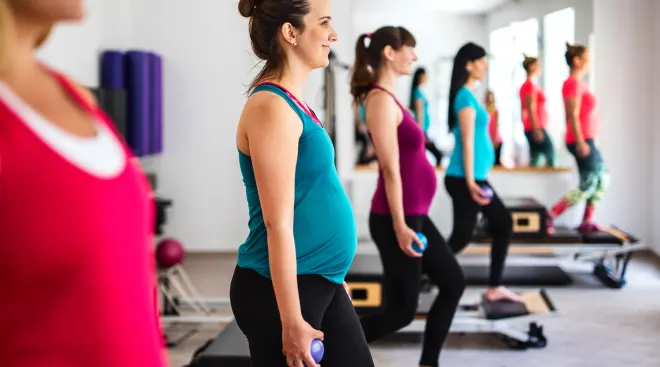The Best Iron Supplements for Pregnancy, According to Parents
In a nutshell:
Based on in-depth research, expert advice and survey feedback from over 350 new and expectant parents, we selected Nature Made Iron 65 Mg Tablets as the overall best iron supplement for pregnancy. It’s easy to swallow and has more than double the recommended daily amount of iron in a single tablet.
A healthy store of iron—alongside other complementary nutrients—is important for mom and baby during pregnancy. But what is iron and why is it so important? Iron is a mineral stored in the red blood cells that carries oxygen from the lungs to the rest of the body, as well as your developing baby. Unfortunately, iron deficiency is a common issue and is the leading cause of anemia during pregnancy. In fact, the American Pregnancy Association (APA) states that approximately 15 to 25 percent of all pregnancies experience iron deficiency. Of course, it’s normal to feel extra tired when you’re expecting, especially in the first and third trimester. If, however, you’re pale, extremely exhausted, getting short of breath or are experiencing heart palpitations you could be anemic. In that case, your doctor will likely talk to you about ways you can supplement your iron supply.
To help you understand the ins and outs of iron supplementation, we spoke with two medical experts and read up on the research from accredited sources—so you don’t have to. Keep scrolling to learn more, then browse our pick of the best iron supplements for pregnancy.
A daily iron tablet can help supplement your mineral stores and reduce the risk of anemia in pregnancy. In order to source the best options, we took the following steps:
-
In January 2024 we surveyed over 350 members of The Bump community. We asked this sample of expectant parents to rate the iron supplements they used during pregnancy and to comment on their overall experience. We evaluated this data and used it to inform our product choices.
-
We interviewed an ob-gyn and a prenatal nutritionist to understand essential factors and safety considerations to keep top of mind when selecting an iron supplement for pregnancy.
-
We also reviewed recommendations from the American Pregnancy Association, National Institutes of Health and the US Food and Drug Administration.
-
We scoured forums and message boards and read user reviews to find out how these iron supplements performed for parents nationwide, because every pregnant person’s experience is different.
-
We considered a list of criteria when sourcing supplements, including dosage, formula type, other nutritional factors and, last but definitely not least, safety. It’s important to note that the US Food and Drug Administration (FDA) does not approve supplements before they go to market. However, as we want to ensure all of the products we recommend are safe to use under medical supervision, we’ve prioritized supplements that have undergone third-party testing by independent agencies.
Editorial integrity is at the heart of everything we publish. Read about how The Bump develops and reviews all articles, including product reviews.
Overall best iron supplement for pregnancy
- USP verified
- Easy to swallow
- More than double recommended daily amount of iron in a single tablet
- High dose may cause stomach upset
- Some parents report an unpleasant aftertaste
In a recent survey of The Bump community, Nature Made emerged as the number one recommended brand for iron tablets during pregnancy. In fact, 40 percent of survey respondents said it was their supplement of choice—but that’s just one reason why it’s been selected as the overall best. Other reasons include the high iron content and the fact that they are easy to get down. This supplement by Nature Made provides a whopping 65 mg of iron in a single daily tablet (that’s more than double the RDA for pregnancy). Parents also appreciate that the single-dose tablets are less than an inch long making them easier to swallow. “They are small and easy to take,” confirms survey respondent Claudia. Many parents we spoke to said this iron supplement was easy to digest and didn’t cause constipation. But as these tablets contain a higher dose of iron than the standard daily recommended amount, we recommend speaking with your doctor before taking them. Bonus: This daily supplement was third-party tested and received a verified mark from U.S. Pharmacopeia (USP).
Iron type: Ferrous sulfate | Dose: 65 mg | RDA: 361% | Suggested use: Take one tablet daily with water and a meal
Our community says
Affordable and I could tolerate [it]. - Polly*, The Bump survey respondent
They are covered by my insurance so they are free. The pills are also small in size, which is nice. - Jalisa, The Bump survey respondent
I like that the pill is small and easy to swallow. - Greta, The Bump survey respondent
Best slow release iron supplement for pregnancy
- Each tablet contains 45 mg of iron
- Easy to swallow tablet
- Slow-release technology is gentle on the stomach
- Individually wrapped tablets are difficult to open
Pegged as the top-rated iron supplement by medical professionals, Slow Fe is a great option if traditional tablets make you queasy. You only have to take one tablet per day. And a controlled release system delivers the high potency iron you need, while still being gentle on your stomach. Survey respondents also noted that this iron supplement didn’t back them up, which is a huge plus. “My biggest concern was constipation from iron supplements. Fortunately, that doesn’t occur with this supplement,” says The Bump survey respondent, Connie*. Each tablet contains 45 mg of elemental iron (the equivalent of 142 mg of ferrous sulfate), so you’ll get all the minerals you need in one small easy-to-swallow tablet.
Iron type: Elemental iron | Dose: 45 mg | RDA: 250% | Suggested use: Take one tablet daily
Our community says:
I take Slow-Fe: It doesn't constipate you like some of the other brands. I take one tablet a day at night time with a snack (since my prenatals are taken in the morning). - Lindseylouwho, The Bump forum member
My OB told me to get on an iron supplement as well. I asked her and the pharmacist what was the best one to take throughout my whole pregnancy and they both recommended Slow Fe. It's a slow release iron supplement. I take one every night before I go to bed. I really recommend this iron supplement! - vflemming, The Bump forum member
Keeps my hemoglobin level within normal and helps keep me and my babies healthy. - Rachel*, The Bump survey respondent
Best iron gummies for pregnancy
- Third-party tested
- Contains 26 mg of vitamin C
- Made without gluten, wheat, dairy, soy or GMOs
- Contains sugar
- Gummies only contain 74 percent of iron RDA
If you struggle to swallow tablets, these gummies are a good way to supplement your existing mineral stores. Rather than feeling like a chore, chew two gummies per day and take it as a sweet treat. The gummies are grape-flavoured and are gluten and dairy free. A single serving contains 20 mg of easily digestible iron—plus 26 mg of vitamin C to support iron absorption and general health. And while they don’t take the form of a traditional pregnancy iron supplement, these gummies are still third-party tested for safety.
Iron type: Ferric saccharate | Dose: 20 mg | RDA: 74% | Suggested use: Eat two gummies daily
Our community says:
I had pregnancy anemia in the second trimester. For a couple of weeks, I had fatigue and was basically sleeping or laying down all day. Then a couple of times I actually saw stars while trying to stand up! My ob-gyn said my iron was on the low side. I took this product and it thankfully made a difference within days; no more fatigue or stars/dizziness. - Natalie G., senior editor at The Bump
Best liquid iron supplement for pregnancy
- Pleasant flavor
- Gentle on the stomach
- Liquid formula is easy to take
- High price point
- Contains sugar
- Metallic aftertaste
A liquid formula is another good alternative if iron tablets for pregnancy don’t agree with you. Floradix Liquid Iron contains a form of iron called ferrous gluconate that’s easily absorbed by the body and won’t wreak havoc on your tummy. It also contains vitamin C to help your body absorb the iron. A single serving contains 56 percent of your daily iron needs and the brand recommends adults take it twice a day, so you’ll easily hit your mineral goals. One thing to note is that this liquid iron supplement contains herbal extracts, so always consult your doctor before using it and do not exceed the recommended daily dose.
Iron type: Ferrous gluconate | Dose: 20 ml | RDA: 112% | Suggested use: Take 10 ml twice daily
Our community says:
I take a liquid iron supplement called Floradix. I take it with food and have not experienced nausea from it, but the really nice thing is that unlike iron tablets it does not cause constipation. It is expensive, though. - pillowass, The Bump forum member
I'm told that when it comes to supplementing iron, Floradix is the way to go in terms of having the least side effects. - kerrbear72, The Bump forum member
Floradix is what my midwife recommended for me, too, and said it didn't have the side effects that tablets can have. - 3rdat40, The Bump forum member
Best vegan iron supplement for pregnancy
- Plant-based formula
- Non-constipating
- Contains 50 mg of vitamin C
- Some people say the capsules have a strong aftertaste
The best iron supplement for pregnancy works with your lifestyle, which is why we recommend this option for people on a plant-based diet. A single capsule contains 25 mg of easily digestible iron, vitamin C to aid absorption and an iron-rich food blend made using organic beet, spinach, kale, Swiss chard and pumpkin seeds. It’s gentle on the stomach and the planet, making it a winner in our book.
Iron type: Ferrous bisglycinate chelate | Dose: 25 mg | Suggested use: Take one capsule daily with a meal and a full glass of water
*Note: Some names have been changed due to privacy requests.
In most cases, yes, iron supplements are safe for pregnant people. According to Sherry Ross, MD, an ob-gyn, women’s sexual health expert and author of the She-ology series, iron supplements are commonly recommended during pregnancy in addition to a prenatal vitamin. With that said, Ryann Kipping, MPH, RDN, CLEC, founder of The Prenatal Nutritionist, advises people to proceed with caution and to speak with their doctor before adding any supplements to their diet.
If you have a preexisting condition, it’s especially important to check with your doctor before taking any supplements. “Pregnant women with a medical condition called hemochromatosis, where the body creates excessive iron, should not take additional iron during pregnancy,” says Ross. Other conditions where iron supplements should not be used include sickle-cell anemia and thalassemia.
While iron supplements are generally considered to be safe, keep in mind that iron tablets can cause side effects during pregnancy. “Iron can be hard on the gastrointestinal tract causing constipation, nausea, diarrhea, stomach cramps and vomiting,” explains Ross. Constipation—a symptom that many pregnant women are already prone to—is one of the main side effects. While you can combat this by taking a stool softener, Kipping recommends pregnant folks consistently consume 30 grams of fiber per day accompanied by plenty of fluids. Another thing to note is that there are some kinds of anemia that aren’t treated with iron supplementation. In these cases, taking iron may do more harm than good.
If your health provider gives you the green light to use an iron supplement during pregnancy, here are some key factors to consider:
-
Dosage. It’s important to work with your doctor to determine the correct dosage of iron during pregnancy, as they will take into account your blood work, diet, lifestyle and other factors. With that said, the National Institutes of Health states that the recommended daily allowance (RDA) of iron for pregnant people is 27 mg per day.
-
Easy to absorb. As mentioned above, iron supplements can aggravate nausea, constipation and other pregnancy-related ailments. To curb side effects, Ross advises parents to choose an easily absorbable form of iron, such as iron bisglycinate or ferrous sulfate. If possible, opt for a slow-release formula, as this type is gentler on the stomach.
-
Added nutrients: Taking vitamin C with an iron supplement can help improve absorption in the gastrointestinal tract. In fact, there are some supplements that contain both iron and vitamin C in one pill.
-
Timing. If your doctor does recommend taking an iron supplement, ask for advice on what time of the day to take it, especially if you are on other over-the-counter or prescription medications. For example, the APA states that “it’s important to take iron at least two hours before or four hours after taking antacids as they can interfere with iron absorption.”
Before you run out and stockpile supplements, take note of what’s already in your refrigerator. According to Kipping, “the goal is to meet your iron and vitamin C needs through food first.” The best way to get the iron you need is by eating iron-rich foods like lean red meat, chicken, dark leafy greens, lentils and chia seeds. Unless you follow a plant-based diet, Kipping suggests focusing on animal-based protein sources as they deliver “heme iron,” which is easier to absorb and is better utilized by the body.
Vitamin C also helps the body absorb iron, and can also be found in natural sources, such as broccoli, oranges, bell peppers, kale and strawberries. Try to include these nutrient-rich foods in your diet or make a habit of drinking a glass of fresh orange juice every day.
About the writer:
Martina Garvey is an editor at The Bump, where she writes and edits articles about the best pregnancy products and baby gear on the market. During her many years on The Bump staff, she’s learned a great deal about pregnancy nutrition and the importance of prenatal supplements.
Please note: The Bump and the materials and information it contains are not intended to, and do not constitute, medical or other health advice or diagnosis and should not be used as such. You should always consult with a qualified physician or health professional about your specific circumstances.
Plus, more from The Bump:
Sherry Ross, MD, is an ob-gyn and women’s sexual health expert. She’s also the author of She-ology: The Definitive Guide to Women’s Intimate Health. Period as well as She-ology, The She-quel: Let's Continue the Conversation. She received her medical degree from New York Medical College.
Ryann Kipping, MPH, RDN, CLEC, is the founder and CEO of The Prenatal Nutritionist. Kipping earned her degree in nutritional sciences at the University of Oklahoma and holds a master’s in public health from San Diego State University. She regularly posts prenatal nutrition content on Instagram at @prenatalnutritionist.
American Pregnancy Association, Anemia During Pregnancy
American Pregnancy Association, How to Treat Iron Deficiency During Pregnancy
National Institutes of Health, Iron Fact Sheet for Health Professionals, April 2022
U.S. Food and Drug Administration, Questions and Answers on Dietary Supplements, October 2022
Navigate forward to interact with the calendar and select a date. Press the question mark key to get the keyboard shortcuts for changing dates.

































